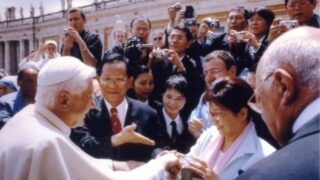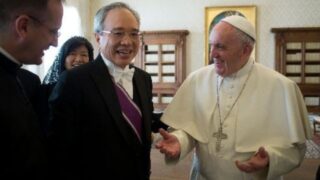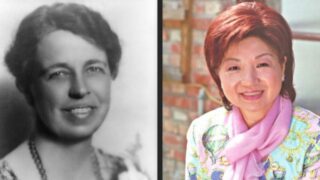We live in a historical time when ideologies regard conscience as something suspect. Dr. Hong’s apology for conscience offers the best defense against the ideologues.
by Massimo Introvigne*
*“A paper presented at the 2023 Parliament of the World Religions, Chicago, August 15, 2023.


The general theme of the 2023 Parliament of World Religions is “A Call to Conscience,” and this session presents a movement that puts conscience at the very center of its spiritual path, Tai Ji Men. Indeed, when assessing the importance of Tai Ji Men’s leader, Dr. Hong Tao-Tze, in the broader landscape of contemporary spirituality, I believe that his defense of conscience is what makes his contribution uniquely relevant.
There are several misunderstandings about conscience. One is that the question of conscience is extremely complicated. As Dr. Hong teaches us, this is basically a lie. A philosophical book about conscience can be very technical and difficult to read for the uninitiated, yet the common experience of conscience is very simple. We pay the coffee shop’s bill of ten dollars with a twenty-dollar banknote. The waiter makes a mistake and brings us as change not a ten-dollar but a hundred-dollar bill. We take it, but when we are leaving the coffee shop we realize the waiter’s mistake. While our first impulse might be to pocket the unexpected hundred dollars and be happy, an inner voice tells us that this would be wrong. We give back to the waiter the banknote, telling him he made a mistake and should give us ten dollars instead of a hundred. Most people, with the exception of a few scoundrels, would listen to the still small voice and give the hundred dollars back. This small voice is the conscience. We all experience it.
This was so obvious that for centuries nobody really believed it was in need to be explained. There were no defenses of conscience because conscience had no enemies. However, in the 19th century, modern ideologies appeared, and started attacking the very notion of conscience.
As Dr. Hong says, “conscience is innate.” It is within us. For believers, it is the voice of God; for non-believers, it is the voice of our deepest and noblest human nature. But the 19th century ideologues told us that it is a false voice of false gods. When we hear a voice we call conscience, Karl Marx said, we hear in fact what has been hammered inside our consciousness since childhood by capitalist society. The so-called conscience is just a subtle mechanism created to prevent the poor from rebelling against the rich. The voice that says, “do not steal” is in fact telling us “remain submitted to the factory owner,” or to the government. It is a voice aimed at preventing revolutions. For Marx conscience is not innate, it does not come from human nature or from God (both do not exist, according to Marxism). It has been put inside us by the governments, the religions, and capitalism to perpetuate the oppression of the proletarians.


At the other extreme of the political spectrum, German philosopher Friedrich Nietzsche, who was read with interest by the Nazis, famously wrote that “The bite of conscience, like the bite of a dog into stone, is stupidity.” Nietzsche believed that for the strong to dominate the weak is natural and ultimately beneficial to society. However, the strong are not the majority. The majority, consisting of the weak, invented morality and religion, in the West particularly in the shape of Judaism and Christianity, whose aim was to persuade the strong that dominating the weak was wrong and immoral. Religious education put into the strong something it called conscience, telling them they should come to an accommodation with the weak. For Nietzsche, conscience is a lie and a trap. The strong should break free from it and start dominating the weak again without feeling guilty. While Nietzsche died in 1900 and cannot be held responsible for how the Nazis used his ideas, that they adopted selectively, it is not difficult to understand why Hitler liked them.


Then, we have Sigmund Freud, whose indictment of conscience is still persuasive for many Western liberals. Freud believed that when children are born, they are naturally dominated by their quest for pleasure, which quickly evolves from the pleasures of food to those of sexuality. Because a world dominated by the principle of pleasure would be chaotic, since times immemorial parents teach their children that some things, while pleasurable, should not be done. By repeating the same prohibitions time and again, parents create in the children what Freud calls superego, which according to him religions mistakenly call conscience. For Freud too, “conscience” is not innate. It is created by the repetition of parental prohibitions, which the children internalize so that when they grow up and the parents are no longer there they keep hearing an inner voice telling them that certain forms of behavior are wrong. Contrary to some simplistic accounts of his ideas, Freud did not believe that conscience should be simply eliminated. To avoid social chaos, a modicum of “conscience,” in fact of superego, was necessary. However, Freud taught that “conscience” should be considered with skepticism, because particularly in the sexual sphere parents tend to be conservative and instill in their children old-fashioned and reactionary principles.
In 1965, French philosopher Paul Ricœur called Marx, Nietzsche, and Freud the three “maîtres du soupçon,” the “masters of suspicion” that made us regard the conscience as something suspect. Because of these three ideologues, many no longer trust their conscience. They are no longer sure that it is the innate voice of God or human nature. What if the “masters of suspicion” were right, and what we call the voice of conscience is in fact the voice of those who want to deny us the right to revolution, to power, and to pleasure, who have instilled in us their pseudo-values and taught us to call them conscience?
As Ricœur noted, the damage done by Marx, Nietzsche, and Freud is incalculable, because they gave us a world without conscience, and as such open to all totalitarianisms and all forms of oppression.
There is only one way to answer them, and get rid of the suspicion, and it is the way of Dr. Hong. It is not to write treatises about conscience, although they do have their place and their usefulness, or advocate that Thomas Aquinas and Kant, who in different ways believed in conscience, taught a philosophy who was not only more persuasive but also more beneficial to humanity than the “masters of suspicion.” I agree, but the damages the latter did are so deep that philosophical discussions will not return our lost conscience.
The key, as I mentioned in the beginning, is to insist on the fact that conscience is not complicated. It is basically simple. And yes, it is innate. The still small voice will tell us to give back that hundred-dollar bill given to us by mistake even if we were never explicitly taught about conscience in school or in church. Conscience is just there.


Some years ago, Dr. Hong sent to me as a gift for the new year 2021 a desk calendar called “Maxims of Conscience.” It had a maxim about conscience for each month. The maxim for January was precisely “conscience is innate,” and those for the following months documented this truth. We learned that relying on conscience creates wisdom, peace, happiness, social solidarity, love. I know, each of these maxims can be demonstrated philosophically. But we can immediately grasp in our personal experience that they are true. We also experience that abandoning conscience and following the “masters of suspicion” create war, unhappiness, social chaos, oppression, concentration camps, and a destructive criticism of morality.
When December came, Dr. Hong’s desk calendar told me that “Conscience can change the world. The world is growing inside a pupa, a compass of conscience, and it can break through the cocoon and transform into a dazzling butterfly.” It is a simple as that. And we should all be grateful to Dr. Hong for being the champion of conscience in a time of history when conscience needs to be defended.









